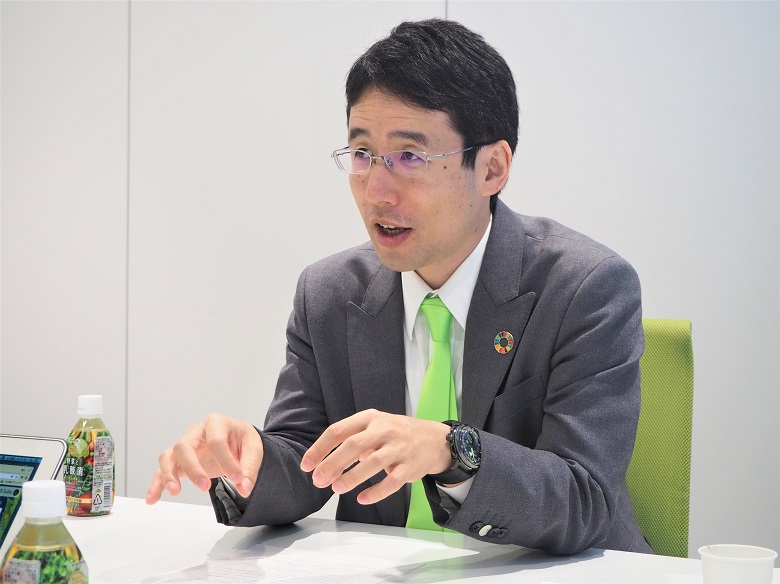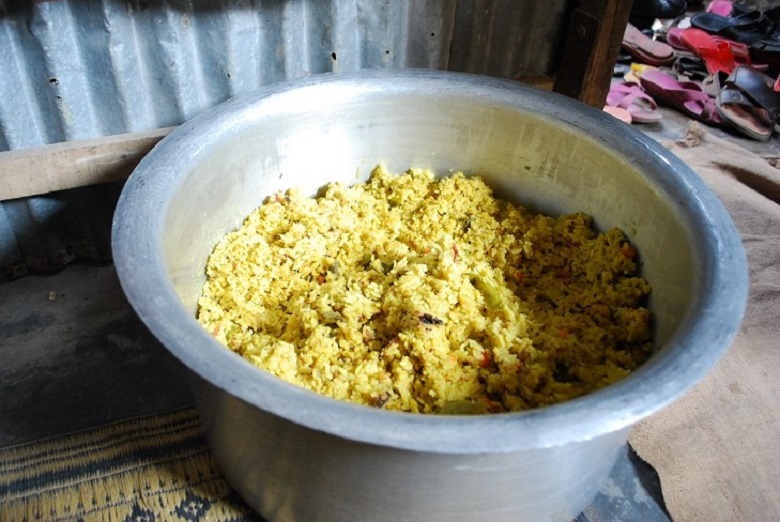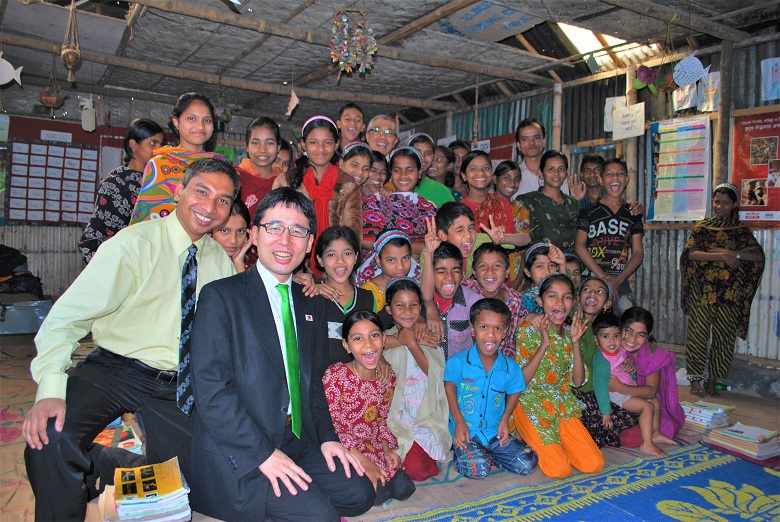Euglena GENKI Program has delivered approximately 6.9 million meals (as of the end of December 2018) of Euglena cookies to Bangladeshi children suffering from malnutrition.
Continuing from the first part, we will ask Mitsuru Izumo, President and CEO, about the meaning of companies working to solve social issues.
Can business really change the world?
If you are aware of the problem, you can move a venture company with a small turn.
-In the "GENKI Program", which is an initiative to solve problems in Bangladesh, Euglena is proceeding in the form of "business" by allocating a part of the sales of products and collaborating with supporting companies. Why are you working as a business rather than a CSR activity?
Izumo: I just said, "I tried what I could do and it was this way."
Compared to CSR, I think there are both good and bad sides. Some may point out that "the venture may not have enough expertise to work as a business" or "it may be even after the company grows larger".
In the end, it's just that social business was the way I started up with my colleagues and was able to do it naturally. We did not go through any difficult examinations and discussions, but we learned and improved while running in a way that suits us. That is still going on.

-There are many public institutions in the world, including UN agencies, that work to solve social issues. What do you think is the significance of companies entering the market as a business and working to solve problems?
Izumo: I think this is ... we have to find it as we continue.
Since I was a student, I have had the opportunity to see the activities of the United Nations up close, but the United Nations is not omnipotent. There are some difficult parts. There may be a way to submit a complaint to the United Nations, but I started by doing what I could with my colleagues without doing such a confusing thing. Being able to move as you wish may be a merit of a company.
-Is there an aspect that is easy to move because it is a corporate activity?
Izumo: Yes. The United Nations is good at changing the country at once with a big job with a certain sense of scale. Aspiring and talented international civil servants are using their vast know-how to carry out projects such as infrastructure development and financial system construction that will eventually appear in textbooks.
When asked that "1 billion people are short of food," the United Nations is seriously trying to make a lot of bread and rice balls and deliver them to 1 billion people. It is unlikely that UNHCR (United Nations High Commissioner for Refugees) will prepare only 840,000 meals in a refugee camp of 850,000 people. That is why we also deliver a large amount of food to Bangladesh.
However, there are some parts that cannot be seen due to the large scale. What is really lacking for people suffering from malnutrition is the nutrients they get from fresh vegetables and fruits, meat, fish and milk. The United Nations knows that, but it's difficult to reach a billion people with Earth's production capacity.
In fact, Bangladesh has a 100% self-sufficiency rate of rice, and the locals eat only curry without ingredients. Even if Kanpan arrives as relief supplies, I am full and do not eat it. I value the can that was in it rather than the contents. This is because cans have value such as being used to prevent leaks and being resold.
It's easy to say that the United Nations hasn't been able to do it, but if you're aware of the problem, not just making complaints, you can move a fast-moving venture company. Don't you think it's a simple story?

I'll do it because I want to do it, I'll do it because there's fun ahead
-For those who want to contribute to solving social issues as individuals, I feel that there is an option to work in a company that can turn around.
Izumo: That's right. I think you can choose what the person wants to do now, depending on whether you like it or not. For those who want to do a job that has a big impact on millions or tens of millions of people, a place like a UN agency would be suitable.
Our challenge is to meet people who may be 10,000 people, but who are really happy to say, "Something delicious has arrived from Japan!"
When I delivered 200,000 meals to the Rohingya refugee camp, I couldn't speak at all. Even so, since they are human beings, the fact that they came all the way from a distant place can be conveyed to the other party. There were many people who said, "Thank you for bringing nutritious food from Japan" and "Otsukare-sama".
Even people who are exhausted beyond words can feel at ease if they bring them home safely, and they will remember, "This is a food aid from Japan. By the way, the people who distributed it were also Japanese." Maybe.
Euglena cookies from the "GENKI Program" will become pianists in the future. Bangladeshi and Rohingya children may grow up as pianists and tour the world. In Japan, it may be performed in a famous place like Suntory Hall. I enjoy doing it while thinking, "It would be really great if such a delusion were realized."
-"I do it because I want to do it, I do it because it's fun". It may be the merit of corporate activities to be able to change something with it.
Izumo: Yes, I think it's a good thing about venture companies. Individuals can move more easily.
I think everyone in the world thinks things too hard. It's like, "You can't start unless you think carefully and get a perfect score." But it doesn't make sense if you can't take any action with it.
We don't know how many points we can get, but we have acted with the attitude of trying. How would you feel if you were working on it for the first time and the result was 50 points? Many people say, "I'm sorry, I got 50 points ...". But I think, "I got 50 points even though it was the first time! It's amazing!" It may not be fair for me to rate an in-house project, but if it's the first time I get 50 points, I think it's 50,000 points.
-Finally, please tell us about what Euglena is aiming for in the future to solve social issues.
Izumo: We will act until the malnutrition of one million children in Bangladesh is zero. For that reason, I'm going to do anything anyway, so it will be absolutely zero, but I will do it until it can be realized. If we can eliminate malnutrition in one million people, we would like to publish a report to the United Nations based on that achievement.
Seeing that, the United Nations may say, "Let's do this in 100 places." That will solve the malnutrition of 100 million people. Furthermore, if "let's do this in 30 countries / regions", the malnutrition of 3 billion people will be improved.
So, first of all, I would like to make a track record of 1 million people. Our vision for the future is to make a baton touch with the United Nations.

Sentence: Shinsuke Tada
President of Euglena Co., Ltd.
Mitsuru Izumo
Joined Bank of Tokyo-Mitsubishi in 2002 after graduating from Komaba Toho Junior and Senior High School and Faculty of Agriculture, University of Tokyo. Euglena Co., Ltd. in 2005 and became president. In December of the same year, we succeeded in mass-culturing edible outdoor mass of the Euglena
Young Global Leader of the World Economic Forum (Davos Conference) won the 1st Japan Venture Award "Prime Minister's Award" (2015). In his book, "I decided to save the world with Euglena. (Shogakukan Shinshosha).

